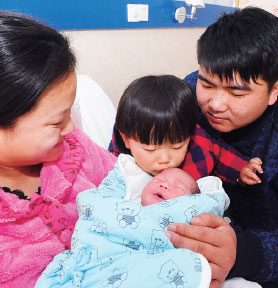
Mothers-to-be practice yoga at a training institute in Nanchang, Jiangxi province, in January. (Zhou Mi / Xinhua)
The number of babies born in the first half of the year was 8.31 million, a rise of 6.9 percent over the same period last year, a significant increase despite the declining number of married women of fertile age, the commission said.
In addition, the sudden rise in pregnancies has resulted in maternity services coming under greater strain, and both facilities and hospital staff are under-resourced, according to the commission.
Of the 90 million women now eligible to have a second baby, 60 percent are age 35 or older, which means they are considered to be at higher risk during pregnancy, the NHFPC said.
Gu said about 150 pregnant patients with cardiac complications were received by Anzhen Hospital last year, compared with approximately 110 in 2011. This year, the number is expected to surpass 180.
Acting on traditional beliefs, many women are opting to have another child, according to Gu: "Many of these patients are seeking treatment and care in our hospital, but not all women are suitable for pregnancy. Women with serious conditions are very likely to give birth to an unhealthy child, and their own lives could also be threatened during childbirth."
Liu, the cardiologist, urged older women to assess the risks they face before deciding to have a child.
"With the rise in age, pregnant women have a higher chance of developing illnesses. They must be aware of their physical condition before pregnancy to reduce the risk to them during childbirth," she said.
He Wenjie, a gynecologist at the reproductive medicine department at Xuzhou Maternal and Child Healthcare Hospital, in Xuzhou, Jiangsu province, has also seen a rise in the number of older patients: "The average age of patients I am receiving is rising. It is crucial that all women, especially those of older age, have checkups before pregnancy to reduce the health risk."
Preventative measures
The NHFPC said health authorities will take more measures in the next few years to improve the health of pregnant women amid rising rates of mortality during pregnancy.
Hospitals nationwide will add 89,000 obstetrics beds to increase the supply of resources and local authorities will upgrade emergency equipment at hospital obstetrics and pediatrics departments.
The commission will also select a number of national midwifery-training bases and organize training related to the treatment of pregnant women with critical conditions.
It will also cooperate with other departments to provide training, with the aim of producing 140,000 extra obstetricians and midwives.



















































